- Home
- Stephen Hunter
Point of Impact Page 5
Point of Impact Read online
Page 5
Bob knew then. He’d suspected before but now he knew. They were playing him, guiding him; they weren’t what they said. Then who were they?
Bob smiled.
“Now what, colonel?”
“Well, let’s eat; then, this afternoon, we’d like to take you to another range, where you’ll be gunning for targets at even farther ranges … beyond five hundred yards. Out as far as a thousand.”
“Sounds good to me,” said Bob.
“Then, tomorrow morning, Mr. Swagger, I’m going to give you some real fun!”
That night, Bob turned down an invitation from the Accutech crew for a nice feed at a restaurant in Thayersville, and instead took his rented car and simply drove alone until he found an unpretentious place farther out, away from the built-up areas, a country place where he could sit by himself and not be paid any mind.
They didn’t follow him. They now kept their distance, thinking sure they had him.
And maybe they did. He was damned curious where all this was headed. He knew in a general sense, of course, what it had to be. It had to be about killing.
His reputation had preceded him. People in certain zones knew of him. Occasionally something weird would come his way—a nibble, a veiled hint, just the slightest indication that some really nice money could be his if he’d only meet so-and-so in St. Louis or Memphis or Texarkana and listen to a certain proposal. These offers came from strange sources, over the years. Certainly, some were from what he took to be organized crime interests. Others came from what had to be intelligence sources—Bob, after all, had done two jobs against civilian targets in the ’Nam, when ordered to in writing by higher headquarters. Still other approaches were simply well-off men with pathological inclinations who wished to use him, in some way, to solve a business problem, to right a wrong, to avenge an infidelity.
No, Bob always explained. It was against the law.
Go away, please.
Most of them did. Though occasionally, one didn’t: there was one breed of hater it took special effort to drive away—those who knew that the country was entirely theirs, and that all good things would flow if others were removed. Of course what they meant, usually, was the black people. Bob had served with too many fine black NCOs in the ’Nam to listen to this kind of shit, and though he had more or less given up on violence, he had broken the nose of a fellow from some outfit calling itself the White Order. The man had said through blood and anger they’d put Bob on The List too, and Bob had grabbed the man and thrust the blunt muzzle of his Colt Government Model down his throat and explained simply, “Mister, if you can’t do your own killing, you don’t scare me worth a drink of spit!” The man had pissed in his pants and disappeared off Bob’s mountain but fast.
But now—these others, this damn Colonel Bruce with his medal and his little bird dog Payne. Rich enough to buy this whole spread, bring him way out here, have someone make up these excellent cartridges. Who were they? Who was worth killing to go to this much trouble?
Agency.
He could smell it all over them. This was how the Agency worked, at odd angles, never quite out in the open, bringing you halfway in so that by the time you figured out what was what it took more effort to get out than to stay.
So? He sat and considered, perplexed, aching for a taste of liquor, a cold splash of beer against his throat, to soften up his mind so that he could think better. But he knew one drink and he was lost, so he fought his way through stone-cold sober.
Agency wants me hunting again.
But who?
Bob thought and thought on it in the little restaurant, his head and hip aching, and got nowhere and only after many hours did he notice the place was about to close, and the waitress was making hungry eyes at him. He’d have no part of that, no thank you. No women, no liquor, never again. Only rifles and duty.
But what was duty?
Who was worth hunting?
Who had loaded the Accutech ammo?
Bob got in his car and drove back; he slept dreamlessly, still setting course by a single star: nothing is worth killing.
He’d tell them tomorrow after hearing them out. He would not kill again.
CHAPTER FOUR
The next day they met at the three-hundred-yard range, but without explanation the colonel was absent. Without his intense presence, his people seemed a little more relaxed. The man Hatcher seemed to be in charge, though only barely. He was a wiry fifty-year-old redhead, with spaces between his teeth, a pocketful of pens nested in some kind of plastic envelope in his breast pocket, and the distracted air of a man who knows too much about one thing and not enough about a lot of things. He herded Bob into a black Jeep Cherokee and with two others, including the stolid Payne, they drove over a network of back roads, around the hilltop, to another area.
What he saw shocked Bob some—a large, clear field on the down slope of a hill, at one end of which stood a jerry-built scaffolding, pipes bolted together, the whole mad structure held stable by guy wires sunk into the ground at a variety of points around its perimeter. It looked like a circus tent without the canvas, or the skeleton of a building without the cement.
Bob saw a series of ladders to its upper reaches, and up there he saw a platform where a shooting bench and a chair had been installed.
“It’s a building in Tulsa, Oklahoma,” said Hatcher. “Or, rather, the height and the distances equal exactly the height and distances of a building in Tulsa, Oklahoma. See the car?”
At one end of a dirt road that ran before the whole ridiculous structure there was an old limousine chassis, its engine long since gone, its body rusty, but its passenger compartment reasonably intact; it was attached by chain and winch to what must have been an engine a half mile away.
“Now what the hell is this?”
“It’s our SWAT scenario,” said Hatcher. “We’ve gamed out a situation where we’re going to ask you to fire on a moving target in a hostage situation. You’ll be operating off cues—you’ll be earphoned into a network and you’ll get an okay to fire at a bank robber who’s fleeing the scene surrounded by hostages. You’ll have an envelope of about five seconds to go for a head shot. It’s based on an event that took place in Tulsa in 1986, where an FBI sniper had to take the same shot.”
“What happened?”
“Ah, he hit a woman hostage in the spine, paralyzing her. The bad guy shot two other hostages to death and then killed himself. It was a horrible thing, just a horrible thing. Man, that agent trained for that shot his whole life, and when it came, he blew it. A shame.”
“They were in a limo?”
“No. It was the back of a pickup. We got a deal on the limo.”
The Cherokee parked, and various people stopped scuffling about and came over to greet the team. Hatcher checked with technicians, radios were issued and handed out and they took Bob to a blackboard under a lean-to.
“You know, Mr. Swagger, in the past fifteen years, by our computations, law enforcement authorities, federal and local, have taken over eight hundred fifty precision shots. That is, through scopes at armed felons at ranges from between thirty-five and three hundred fifty yards. Do you know what the one-shot stop ratio is?”
“I’d bet it’s low.”
“Thirty-one percent one-shot drops. Hell, just last year in Sacramento, California, a police sniper took a clear shot at an unmoving gunman through the door of an electronics store and missed him completely. The guy shot three hostages to death before they settled his hash. Do you know why?”
Bob thought a while, took his time, and then delivered an answer.
“Some tiny percentage of the misses might be due to round deviation or equipment failure. But I’d bet the most usual cause is shooter failure. In the ’Nam, I missed my first shot. And my second. It takes practice to get used to staying relaxed while taking the trigger slack out on a man.”
You have to find a little cold place and be there by yourself for a while, he was thinking.
“That’s
right,” Hatcher sang out cheerily. “So our theory is that if we can increase their confidence factor even by a tiny margin, it’s a great thing. You want that guy on the rifle knowing what he’s got in his chamber’s going to do its job if he does his. And one reason he’ll believe it, we’re hoping, is because you’ve told him so and showed him how.”
Bob nodded.
“Can I see the vehicle?”
“No. Think of it this way, did the FBI agent see the vehicle any time before he had to fire? No, he didn’t and we want to put you where he was. And we’re not going to tell you the range either, that’s something we’d like you to dope out on your own. No, what we’d like is to put you up there on what’s supposed to be the fifth floor of the Tulsa Casualty and Life Building. It’s October tenth, 1986, and a bank robber named Willie Downing with a cheap Star 9mm and three female hostages is being driven toward Tulsa International Airport where an airliner is waiting, he thinks, to fly him to Africa. You’re Special Agent Nick Memphis of the FBI, SWAT trained, the best rifle and pistol marksman in the office. Sometime in the next few hours, Willie Downing will be before your sights, having killed a policeman and a bank guard and wounded two more, and now demonstrating serious signs of a PCP-induced psychotic episode. Your supervisor has determined that yours is the best shot; you have the angle and the opportunity. The real Nick Memphis was firing a Remington 700 in .308, but without the heavy varmint barrel—”
“Shouldn’t have mattered,” said Bob, “not for one shot.”
“Anyway, we’re going to tie you into a radio net and a lot of the information you’ll be getting is based on the actual transcripts, so you’ll be in about the same situation as Nick Memphis was. I’ll be on the mike down here, reading you the radio commands to play you just the way his supervisors played Nick Memphis. You’ll have plenty of time to set up, just like he did, and plenty of time to acquire the target while you’re waiting for the green light. So, Mr. Swagger, now that you’ve seen it—do you want to play?”
Bob looked up the teetery structure of rods and lumber. It didn’t seem too damn steady. But it had him. His vanity was pricked. Gould he hit this shot, especially where some federal fool had failed, using up several lives in the process?
Suddenly, for the first time in his stay in Maryland, Bob let the tiniest hint of smile crease his face.
“Let’s do it,” he said, for the moment not giving a damn about Accutech but eager to the point of glee to take on Willie Downing and Nick Memphis.
They told him the real Nick Memphis had fired off of sandbags in a fifth-floor windowsill, and way up in the scaffolding, after a long climb, he discovered that setup, necessarily jury-rigged, but stable enough.
He put on the earphones and hands-free mike, and switched as instructed to Channel 14, the FBI Control Channel.
There was the hiss and crackle of static, then he heard, “Ahh, Charlie Four, do you read, Charlie Four, do you read?”
“Am I Charlie Four?” he asked.
“Affirmative,” came the response. “Charlie Four, please advise as to your position.” It was Hatcher, playacting Base.
“Well, I’m up here, dammit.”
“Bob, let’s put ourself in 1986 for the sake of the exercise,” said Hatcher over the earphones. “Just reply in standard radio argot.”
“Read you, Base. Ah, I’m situated in the fifth floor of Tulsa Casualty, I have a clear view east down—” he tried to remember from the map the name of the street down which Memphis took his shot, “down Ridgely.”
“Ah, okay, that’s an affirmative, Charlie Four, you just hold steady now.”
“What’s the situation?”
“Ah, Charlie Four, we have suspect heading your direction down Mosher. He’s gone through two ambushes but on-site command wouldn’t authorize a go because nobody could get a clear shot at the suspect. He’s surrounded by these damn hysterical women and we think he may have tied himself to them.”
“Read you, Base.”
“Please stand by.”
Bob took a second to look at the rough “street” down which he’d be shooting. The problem, of course, was range. Known-distance shooting was easier, because then you can calculate the bullet drop by the ballistics tables and your own experience. But Bob had no natural feeling for range. Some men could look at something and by the weird mechanics of the brain simply know what the distance was. Not Bob. So he had worked out a crude naked-eye system in Vietnam. If he could make out eyes, he knew he was inside a hundred yards—the rare shot. If he could make out face, he was under two hundred yards. If he could just make out head he was under three hundred. If he could make out only legs, he was under four hundred. If he could make out body, he was under five hundred; if he could only see movement, he was under six hundred.
From his vantage point, he watched as technicians scurried over the killing ground beneath him, examining the chain that would tow the car, fussing with the engine that would pull it, adjusting video cameras mounted on tripods down the roadway. He fixed them in his mind, reading their shape and making his calculations off them. He figured the shooting site would be about 320 yards out.
Meanwhile, the crackle and hiss played against his ears, as he heard other reports from police and FBI units checking in for instruction; it was a constant chatter, a torrent of loose noise. Why hadn’t poor Memphis had a spotter with him, someone to run interference and to shelter him from the hundred distractions?
Though Bob could only see blue-humped mountains and rolling forest and though the breeze played against his skin, cooling it, he had no trouble imagining Memphis in the hot little office behind the sandbags and the rifle, his tension and agitation growing as he waited alone, his excitement bounding as the situation drew nearer and nearer to him.
It was the excitement that fucked him, Bob thought. You don’t shoot from excitement or haste or urgency. You shoot out of calm professional confidence, rooted in the belief, built up over a thousand hours’ practice and a hundred thousand bullets fired, that if you can see it you can hit it.
“Charlie Four, you there?”
“Affirmative, Base.”
“Command advises that suspect vehicle has just turned down Lincoln, entering your district.”
“I have that, Base.”
“ETA four minutes.”
“Read you, Base, back to you.”
“Ah, Charlie Four, I’m getting real bad reports from people in the field, they’re telling me this guy is waving his gun and screaming at the hostages and that every time he sees a police vehicle he acts a little crazier. He’s bad news, bad, bad news.”
“Reading you, Base.”
“Charlie Four, you think you’d be able to make that shot?”
Bob squinted through the scope at the road down which the hostage vehicle would travel.
“I have it big and clear, Base. The shot is there for me if it’s there for you.”
“Charlie Four, this guy could go off at any moment and hurt some more people.”
“I read you, Base. You got an ETA for me?”
“He’s at Lincoln, Charlie Four, Lincoln and Chesley, and a uniformed officer says he’s really flipped out. Makin’ me nervous, very nervous.”
“Base, I make the shot three hundred twenty yards. I can put it in a fifty-cent piece at that range. Confidence is high here.”
“Ah, Charlie Four, I’ve been in contact with command and it’s getting real hairy in that car. We’re, um, we’ve decided to authorize a green light for you, Charlie Four.”
“I’m reading you, Base, and making ready to shoot. I’ll be off the air now.”
“Ah, Charlie Four, that’s a negative. I’ve got two spotters here; I’ll be notifying you when suspect gun is pointed in safe direction and you can go for a head shot, Charlie Four. We can’t risk a spasm shot, do you read?”
“Negative, Base, I can’t be concentrating on anything but my shooting.”
“Then, stand down, Charlie Four, I won’t authorize a
green light unless I’ve visually verified suspect’s gun position, just like the book says.”
So there Nick Memphis had had it. Caught right on the horns. He’d have some guy yelling in his ear as he was shooting, or he’d have to stand down and walk away from it.
“All right, Base, you talked me into it. I’m sliding into shooting position now. You sing out when your people say it’s clear.”
Bob slid the rifle into his shoulder, watched as the scope came up big and bright and clean, a movie-screen world, all in primary colors bold and furious.
“Charlie Four, he’s turned down Ridgely, he’s coming into your kill zone right about now.”
Bob threw the bolt, feeding one of the Accutech .308’s into his chamber. He drew the rifle to him, found the hands-free mike got in the way of his spot-weld, and thus quickly and savagely bent it out of the way, to take his place behind the gun.
It was a modified sitting position, with the weight on his left ham, his body canted slightly as the rifle was pulled to him, while resting solidly on the sandbag barricade. It felt completely moored to the bags, its weight entirely on them. His upper body supported itself on elbows, and the rifle rode a fulcrum of the sandbag, guided by his hands pulling it tight against his shoulder. His hip flared a bit under the strain, but it wasn’t anything he couldn’t handle.
As he looked through the scope, Bob made subtle corrections in his grip and body position, trying to find, given the circumstances, an equipoise: one position where everything was tucked just right, where he felt most comfortable, less stressed, where his breathing was natural and loose, and yet through it all he still felt anchored into his chair and the bench and the bags.

 Point of Impact
Point of Impact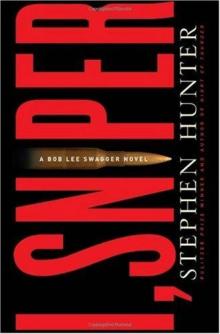 I, Sniper
I, Sniper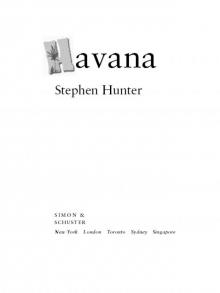 Havana
Havana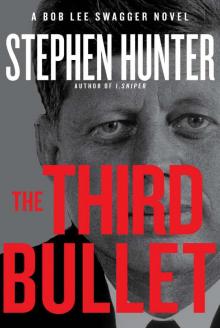 The Third Bullet
The Third Bullet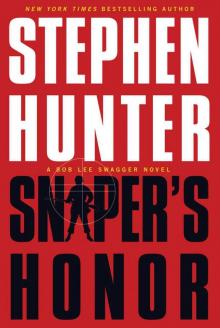 Sniper's Honor: A Bob Lee Swagger Novel
Sniper's Honor: A Bob Lee Swagger Novel Dirty White Boys
Dirty White Boys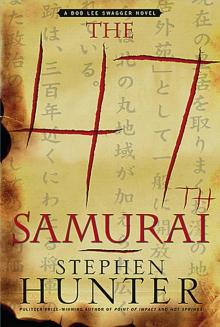 The 47th Samurai
The 47th Samurai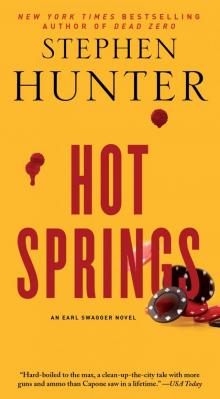 Hot Springs
Hot Springs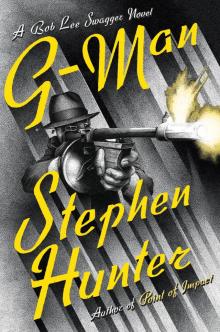 G-Man
G-Man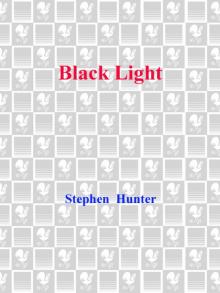 Black Light
Black Light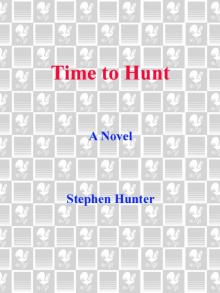 Time to Hunt
Time to Hunt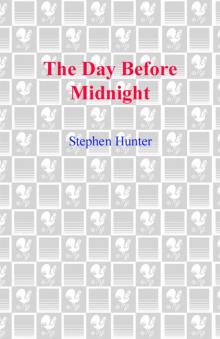 The Day Before Midnight
The Day Before Midnight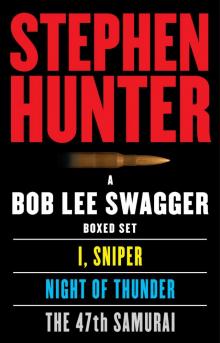 A Bob Lee Swagger Boxed Set
A Bob Lee Swagger Boxed Set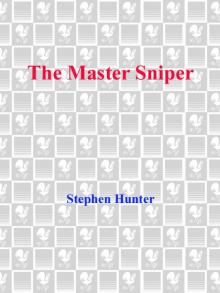 The Master Sniper
The Master Sniper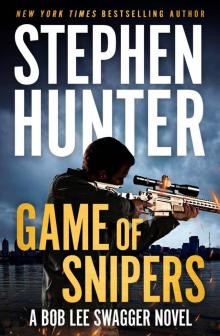 Game of Snipers
Game of Snipers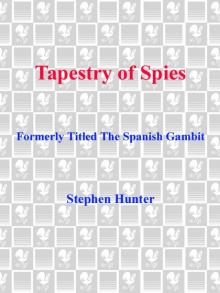 Tapestry of Spies
Tapestry of Spies Citadel
Citadel The Second Saladin
The Second Saladin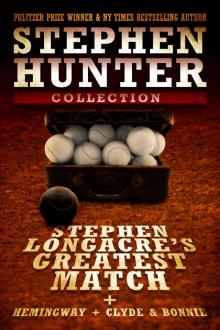 Stephen Longacre's Greatest Match
Stephen Longacre's Greatest Match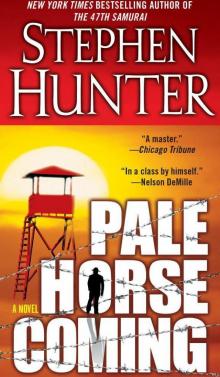 Pale Horse Coming
Pale Horse Coming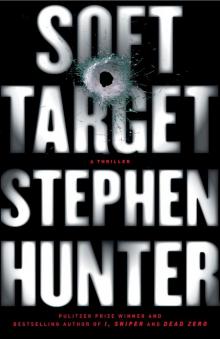 Soft Target
Soft Target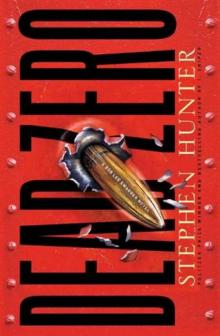 Dead Zero
Dead Zero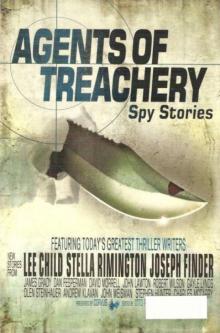 Casey at the Bat
Casey at the Bat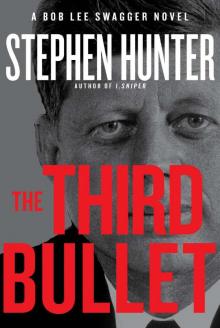 The Third Bullet bls-8
The Third Bullet bls-8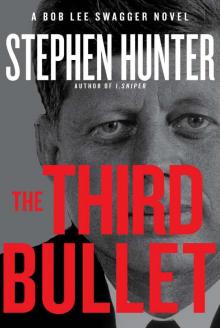 The Third Bullet: A Bob Lee Swagger Novel
The Third Bullet: A Bob Lee Swagger Novel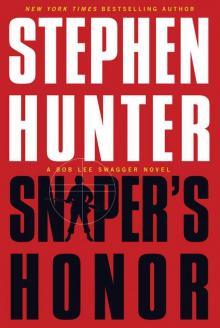 Sniper's Honor
Sniper's Honor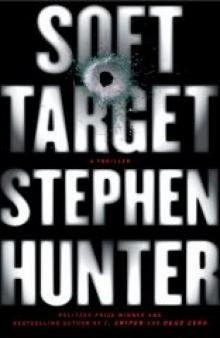 Soft target rc-1
Soft target rc-1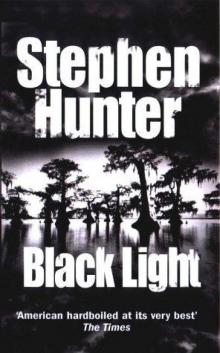 Black Light bls-2
Black Light bls-2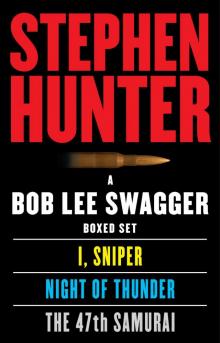 A Bob Lee Swagger eBook Boxed Set: I, Sniper, Night of Thunder, 47th Samurai
A Bob Lee Swagger eBook Boxed Set: I, Sniper, Night of Thunder, 47th Samurai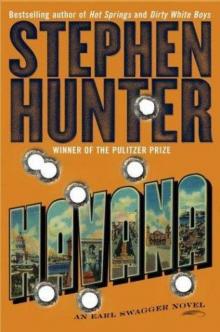 Havana es-3
Havana es-3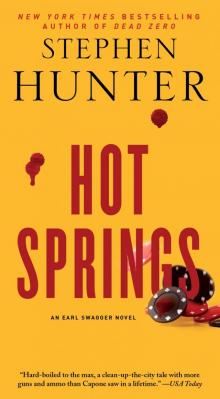 Hot Springs (Earl Swagger)
Hot Springs (Earl Swagger)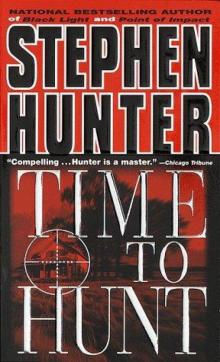 Time to Hunt bls-1
Time to Hunt bls-1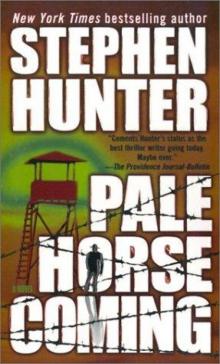 Pale Horse Coming es-2
Pale Horse Coming es-2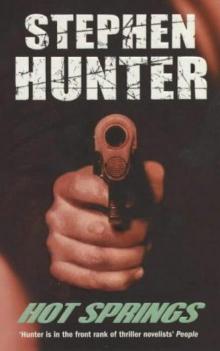 Hot Springs es-1
Hot Springs es-1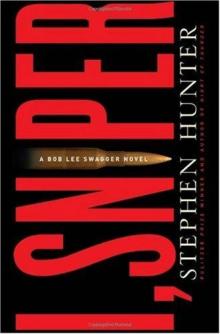 I, Sniper: A Bob Lee Swagger Novel
I, Sniper: A Bob Lee Swagger Novel